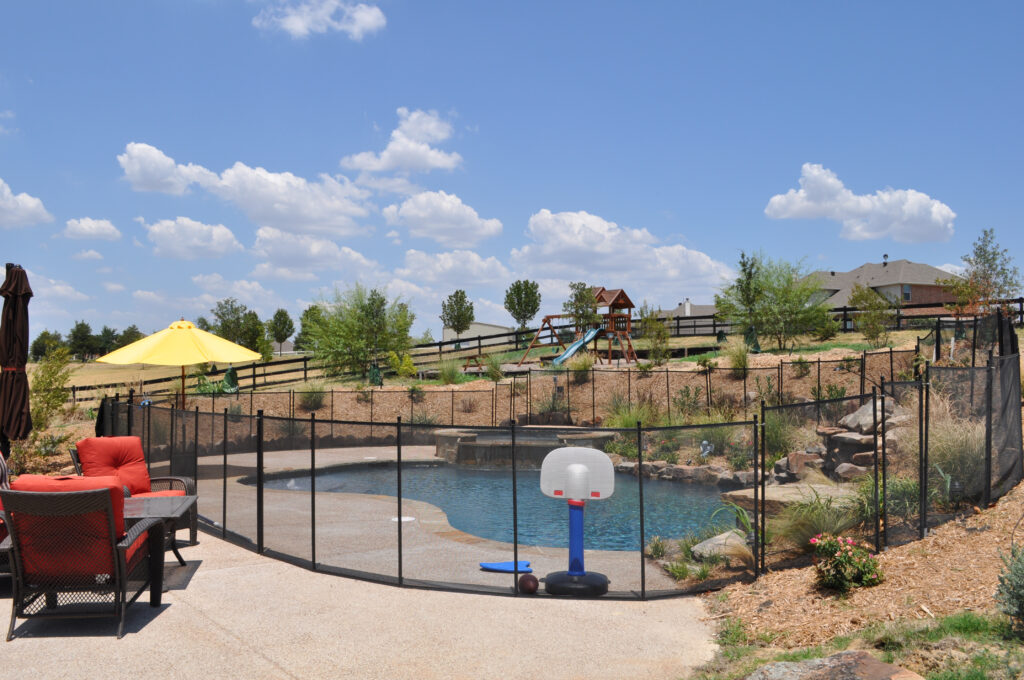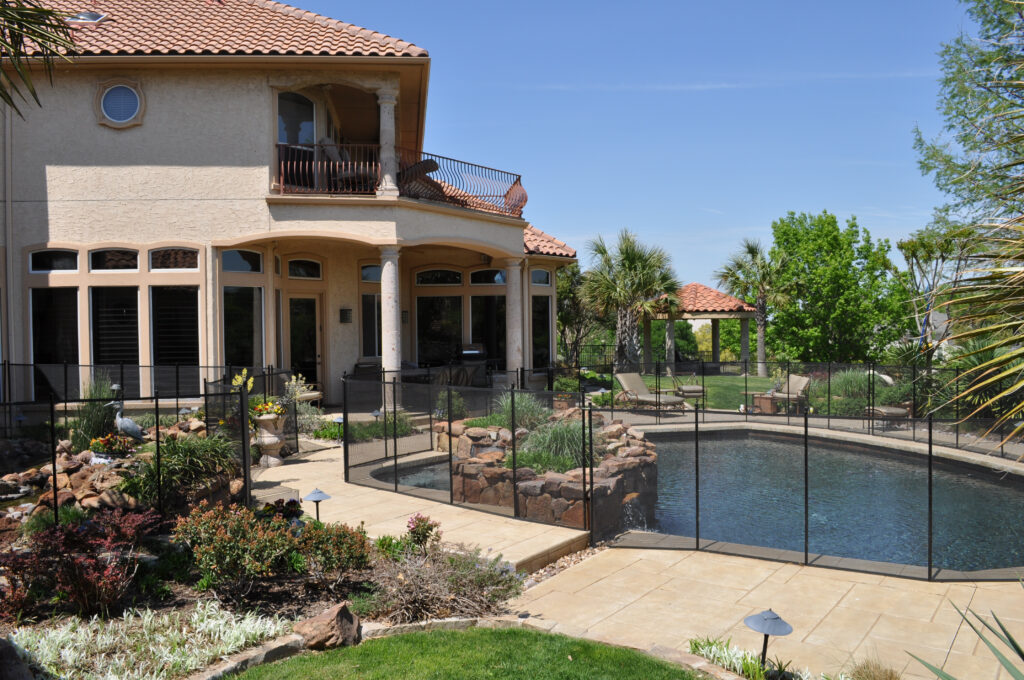With the rise in residential pool installations across the state, California pool fence law has become stricter to help prevent avoidable tragedies. If you’re building a new pool or remodeling an existing one in 2025, it’s crucial to stay compliant with updated safety regulations.
The California Pool Safety Act, enacted under Senate Bill SB442, establishes minimum safety standards for residential swimming pools and spas. This law mandates that all new or remodeled in-ground pools in California must have a physical barrier and at least two of the 7 drowning prevention safety features.
According to the CDC, drowning is the leading cause of unintentional injury-related death among children ages 1 to 4. In California alone, dozens of these incidents occur annually in residential pool environments, often when a child is left unsupervised.
Layered safety measures- fences, alarms, and covers significantly reduce drowning risks. Prior to SB442, many incidents involved pools that lacked proper barriers or had outdated safety systems. By strengthening the California pool fence code, lawmakers aimed to ensure that every pool includes multiple fail-safe protections.
Under the California pool fence law, the minimum required height for a pool barrier is 60 inches (5 feet), measured from the exterior side facing away from the pool. This standard is not coincidental.
By setting the minimum height at five feet, the law aims to reduce unintentional drownings, which remain a leading cause of death among young children in California.
To remain compliant:
These specifications are designed to ensure a truly secure perimeter around your pool. Reputable pool fence manufacturers follow these guidelines to meet California’s stringent safety standards and pass local inspections.
The pool gate requirements in California are strict for good reason. Gates must:
These measures prevent unsupervised access and reduce the risk of gates being accidentally left open.
In addition to a compliant fence, California pool fence law require at least two of the following safety features:
Removable mesh fences are a popular and legal solution. To comply:
At PoolGuard™, we specialize in premium-grade mesh pool fences that are fully compliant with ASTM F2286. Our removable mesh systems are engineered for safety, aesthetics, and code compliance – making them a top choice for California homeowners.
Under the California Pool Safety Act, approved safety covers are one of the permitted secondary safety features, and for good reason. Whether manual or automatic, these covers must meet rigorous standards that ensure they can support weight, resist tampering, and fully prevent access when closed.
Even if a gate is accidentally left open or a child manages to bypass a fence, a properly secured pool cover provides an additional layer of defense that can stop a potential tragedy before it happens.
For compliance, pool covers must adhere to ASTM F1346-23 standards, which verify their ability to block access and withstand environmental exposure.
Under ASTM F2208, approved pool alarms are tested for sensitivity, durability, and effectiveness in real-world scenarios.
Exit alarms are required on any door or window that opens directly into the pool area. These alarms emit a loud, unmistakable sound when opened – helping prevent unnoticed entry, especially by children or guests. To comply with pool fence law in California, these alarms must:

While the pool safety requirements in California set the statewide minimum requirements, many cities and counties enforce stricter regulations, especially in densely populated or high-risk areas. If you’re installing or upgrading a pool fence in California, it’s critical to review your local codes to ensure full compliance.
In Los Angeles County, pool fencing regulations are strictly enforced, particularly in residential zones. The following local rules apply to all new or remodeled in-ground pools:
| Fence height | At least 5 feet tall, measured from the exterior/pool-exposed side |
| Gaps | All gaps must be small enough to prevent a 4-inch sphere from passing through |
| Decorative elements | Decorative elements that could create climbing footholds are strictly prohibited |
| Pool gates | Pool gates must be self-closing and self-latching, should open outward from the pool, and have a latch release at least 60 inches above ground |
| Fence materials | Fence materials must meet durability and climb-resistant standards |
Looking for compliant pool fences in Los Angeles? Discover expert pool fence installation services and trusted pool fence installers in Los Angeles to help protect your home and loved ones today.
San Diego County also enforces strict pool barrier regulations. In addition to the CA pool fence requirements, local inspectors apply the following requirements:
| Fence height | At least 5 feet tall, measured on the side of the enclosure that faces away from the pool |
| Gaps | All gaps should not allow passage of a sphere equal or bigger than a sphere equal to or greater than 1-3/4 inches in diameter |
| Decorative elements | The pool fence should be free decorative elements that could create climbing footholds |
| Pool gates | Pool gates must be self-closing and self-latching, should open outward from the pool with a self-latch device located a minimum of 54 inches from the bottom of the ground. |
| Fence materials | Fence materials must meet durability and climb-resistant standards |
Besides the mandatory pool fence code in California regarding fence requirements, San Diego enforces additional protection measures.
Homeowners must include at least one of the following safety features in addition to a compliant pool fence:
Searching for safe and compliant pool fences in San Diego? Connect with professional pool fence installers in San Diego for a secure and stylish backyard.
The City of Santa Barbara’s Building & Safety Division outlines specific requirements for pool barriers and safety features.
| Fence height | At least 5 feet tall, measured on the side of the enclosure that faces away from the pool |
| Gaps | All gaps should not allow passage of a sphere equal to or greater than 4 inches in diameter |
| Decorative elements | The pool fence should be free decorative elements that could serve as foot or hand holds for children under the age of five |
| Pool gates | Pool gates must be self-closing and self-latching, should open outward from the pool with a self-latch device located a minimum of 60 inches from the bottom of the ground. |
| Fence materials | Fence materials must meet durability and climb-resistant standards |
When a building permit is issued for the construction or remodeling of a pool or spa at a private single-family home, the pool or spa must be equipped with at least two of the following seven drowning prevention safety features:
Looking for a compliant pool fence in Santa Barbara? Find an expert pool fence installation in Santa Barbara to keep your property secure and compliant.

If your pool doesn’t comply with the CA pool fence law, you may face legal penalties, fines, and delays in home inspections or permits. Non-compliant pool areas are considered a serious safety hazard, especially for children. If an accident occurs, the homeowner can be held liable for injuries or fatalities, and insurance claims may be denied.
Licensed pool fence contractors who are familiar with the California Pool Safety Act (SB442) and local building codes are the best choice for installing compliant fences. At Pool Guard USA, we specialize in ASTM-compliant mesh pool fences, and our experienced installers ensure that all components, from height to gate mechanisms—meet state and city regulations. Choosing a qualified professional helps you avoid costly code violations and guarantees long-term protection
Approved materials under California pool fence requirements include:
All materials must meet standards for durability, climb resistance, and gap spacing. The design should not allow a 4-inch sphere to pass through any opening, and the surface must not have footholds that enable climbing.
Yes. Failing to comply with the pool fence laws in California can result in fines, code enforcement actions, and even lawsuits in the event of injury or drowning. Local building inspectors may also issue a stop work order or deny your certificate of occupancy for new builds or remodels. Non-compliance can also reduce your property value and limit the ability to sell or refinance your home.
Complying with the California pool fence law isn’t just about passing inspections; it’s more about protecting the lives of your loved ones. The California Pool Safety Act was established to reduce preventable drownings by enforcing layered safety systems for all new or remodeled residential pools. Whether you’re in Los Angeles, San Diego, Santa Barbara, or anywhere else in the state, the law is clear: your pool must have a minimum 5-foot barrier and at least two additional safety features, such as alarms, covers, or mesh fencing.
Still unsure whether your current setup meets the California pool fence code? Our pool fences in California are professionally installed, fully compliant with SB442, and built to meet ASTM standards. We help you feel confident that your pool area is safe, secure, and fully up to code.
Please fill out the form below with your information. Your local dealer will be notified about your inquiry.
Please fill out the form below with your information. Your local dealer will be notified about your inquiry.